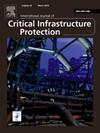Hardware security modules for sustainable energy systems: Targeted review
IF 5.3
3区 工程技术
Q1 COMPUTER SCIENCE, INFORMATION SYSTEMS
International Journal of Critical Infrastructure Protection
Pub Date : 2025-08-12
DOI:10.1016/j.ijcip.2025.100791
引用次数: 0
Abstract
As the global transition toward green energy intensifies, the integration of Hardware Security Modules (HSMs) into sustainable energy systems is emerging as a critical component for ensuring cybersecurity and operational resilience. HSMs are essential for safeguarding sensitive data, enabling secure communication, and maintaining the integrity of operations within smart grids and renewable energy infrastructures, which are increasingly susceptible to cyber threats. Despite the growing relevance of HSMs in this domain, there remains a significant gap in the academic literature concerning their specific adoption and optimization in sustainable energy contexts. This paper addresses this gap by providing a comprehensive analysis of the role and integration of HSMs in sustainable energy systems. It examines how HSMs enhance system security through advanced cryptographic protections, operational robustness, and secure data exchange. The study further explores key optimization strategies, such as energy-efficient circuit design, advanced process technologies, and duty-cycling mechanisms that align HSM functionality with energy sustainability goals. Additionally, the paper identifies and discusses major challenges affecting HSM deployment, such as cost constraints, energy consumption, and interoperability with legacy infrastructure. By synthesizing these findings, the paper unveils the strategic implementation of HSMs in sustainable energy frameworks and lays a foundation for future empirical investigations aimed at validating and extending the discussed approaches.
可持续能源系统的硬件安全模块:有针对性的审查
随着全球向绿色能源转型的加剧,将硬件安全模块(hsm)集成到可持续能源系统中正在成为确保网络安全和运营弹性的关键组成部分。hsm对于保护敏感数据、实现安全通信以及维护智能电网和可再生能源基础设施的运营完整性至关重要,这些基础设施越来越容易受到网络威胁。尽管hsm在这一领域的相关性越来越大,但关于其在可持续能源背景下的具体采用和优化的学术文献仍然存在重大差距。本文通过对可持续能源系统中hsm的作用和整合进行全面分析,解决了这一差距。它研究了hsm如何通过高级加密保护、操作健壮性和安全的数据交换来增强系统安全性。该研究进一步探讨了关键的优化策略,如节能电路设计,先进的工艺技术,以及使HSM功能与能源可持续性目标保持一致的职责循环机制。此外,本文确定并讨论了影响HSM部署的主要挑战,例如成本限制、能源消耗以及与遗留基础设施的互操作性。通过综合这些发现,本文揭示了可持续能源框架中hsm的战略实施,并为旨在验证和扩展所讨论方法的未来实证研究奠定了基础。
本文章由计算机程序翻译,如有差异,请以英文原文为准。
求助全文
约1分钟内获得全文
求助全文
来源期刊

International Journal of Critical Infrastructure Protection
COMPUTER SCIENCE, INFORMATION SYSTEMS-ENGINEERING, MULTIDISCIPLINARY
CiteScore
8.90
自引率
5.60%
发文量
46
审稿时长
>12 weeks
期刊介绍:
The International Journal of Critical Infrastructure Protection (IJCIP) was launched in 2008, with the primary aim of publishing scholarly papers of the highest quality in all areas of critical infrastructure protection. Of particular interest are articles that weave science, technology, law and policy to craft sophisticated yet practical solutions for securing assets in the various critical infrastructure sectors. These critical infrastructure sectors include: information technology, telecommunications, energy, banking and finance, transportation systems, chemicals, critical manufacturing, agriculture and food, defense industrial base, public health and health care, national monuments and icons, drinking water and water treatment systems, commercial facilities, dams, emergency services, nuclear reactors, materials and waste, postal and shipping, and government facilities. Protecting and ensuring the continuity of operation of critical infrastructure assets are vital to national security, public health and safety, economic vitality, and societal wellbeing.
The scope of the journal includes, but is not limited to:
1. Analysis of security challenges that are unique or common to the various infrastructure sectors.
2. Identification of core security principles and techniques that can be applied to critical infrastructure protection.
3. Elucidation of the dependencies and interdependencies existing between infrastructure sectors and techniques for mitigating the devastating effects of cascading failures.
4. Creation of sophisticated, yet practical, solutions, for critical infrastructure protection that involve mathematical, scientific and engineering techniques, economic and social science methods, and/or legal and public policy constructs.
 求助内容:
求助内容: 应助结果提醒方式:
应助结果提醒方式:


